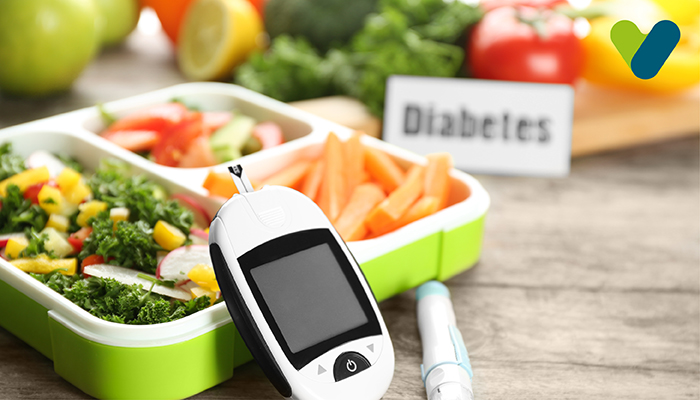When you are suffering from diabetes, your nutrition and physical activity become an important part of your lifestyle.
Following a healthy meal plan and eating foods in diabetes that keep your blood sugar levels maintained is critical. If you keep track of your blood sugar levels, you will be able to see how much control you have over your diabetes.
Proper blood sugar levels are important to stay free of problems such as vision loss and kidney diseases that happen because of diabetes. Proper foods in diabetes can help prevent heart attacks as well.
Diabetes Diet
A typical diabetic diet consists of three meals each day, which are taken at regular intervals. A well-rounded diabetic diet allows you to make better use of the insulin that your body generates or that you receive from a medicine.It helps you maintain your blood sugar levels which are really important to not suffer from complications of diabetes.
Dieticians can assist you in creating a diet that is tailored to your health objectives, preferences, and lifestyle. These specialized diets can help you maintain your blood sugar levels.
Dieticians can also teach you how to modify your eating habits, such as selecting portion sizes that are appropriate for your size and level of exercise to maintain your diabetes.
Which foods can be included in a Diabetes Diet?
Foods in diabetes need to be carefully selected in order to maintain the blood sugar levels of the body. The foods which should be included gestational diabetes diet and other types of diabetic diets are –Carbohydrates – Healthy carbohydrates are an important inclusion to diabetic diets, which aim to maintain blood sugar levels. During the process of digestion in the body, sugars or simple carbohydrates and starches are broken down into blood glucose which is required for the functioning of the body. Healthy carbohydrates such as vegetables, fruits, nuts, whole grains, low-fat dairy products such as milk and cheese, and legumes are important to maintain blood sugar levels of the body. A diabetic diet should not involve any kind of foods or drinks which have added sodium, fats, and sugars.
Fibre Rich Foods - All components of plant foods that your body can't digest or absorb are considered to be a part of dietary fibre. Fibre helps manage blood sugar levels by regulating how your body digests. Some of the fibre-rich foods are fruits, nuts, beans, and peas.
Healthy Fishes - Those who suffer from diabetes and wish to maintain their blood sugar levels with a good diabetic diet should eat heart-healthy fish at least twice a week. Salmon, mackerel, and sardines are high in omega-3 fatty acids, which may help to avoid diabetes-related heart disease. When looking for fish to include in your diabetic diet, stay away from fried fish and species with high mercury levels, such as king mackerel.
Good Fats – Consumption and inclusion of foods that contain monounsaturated and polyunsaturated in diabetic diets can help a person to maintain their blood sugar levels. Some of the foods which include good fats are avocados, nuts, canola, olive, and peanut oils. Oleic acid, a kind of monounsaturated fat that is found in extra-virgin olive oil and related oils. These may help with glycaemic control, lower fasting and post-meal triglyceride levels, and have antioxidant qualities. This is critical since people who are suffering from diabetes have a hard time controlling their blood sugar levels and have high triglyceride levels. Consumption of such food fats helps them a lot.
Foods Which Should Not Be Included in Diabetes Diet
There are many foods in diabetes which should be stayed away from. Diabetes increases your chances of having a heart stroke and the development of hardened and clogged arteries. Consumption or inclusion of these foods in a diabetic focused diet can make things worse –Cholesterol - Rich-fat dairy products and animal proteins, egg yolks, liver, and other organ meats are all high in cholesterol, and these should not be included in a diabetic diet that aims to maintain blood sugar levels.
Trans Fat – Packed, baked goods and other types of processed foods have high fats. These can increase blood sugar levels if consumed.
Saturated Fats - High-fat dairy items, as well as animal proteins such as butter, beef, hot dogs, sausage, and bacon, are foods that should be included or consumed when you have diabetes. Limit your intake of coconut and palm kernel oils as well to maintain your blood sugar levels and to stay away from diabetes-related diseases.
Sodium – Diabetes diet should stay from all rich sodium foods as they can cause major upheavals in blood sugar levels of the body. A diabetic diet should have less than 2,300 gm of sodium in a day.
Results of Diabetic Diets
Diabetic diets such as gestational diabetes diet and insulin resistance diet can have major benefits for your body. They are one of the best ways to maintain and track your blood sugar levels when you have diabetes.You can modify your diabetic diet to your individual goals if you also want to reduce weight alongside maintaining your blood sugar levels. A diabetic diet not only helps you manage your diabetes but also has additional advantages as well for your health.
Following a diabetic diet, which includes plenty of fruits, vegetables, and fibre, is likely to lower your risk of cardiovascular disease and certain types of cancers that can be life-threatening.
Furthermore, eating low-fat dairy products can lower your chance of developing low bone mass in the future as you age.
Diabetic diets are a good way to take control of your diabetes. They help in reducing the chances of developing diabetes-related diseases, which can be life-threatening and damaging in many cases.
Alongside having healthy foods in diabetes, it is also very important to maintain a proper lifestyle which includes exercising and other activities as well. If you cannot figure out a proper diabetic diet yourself, you can take the help of a professional dietician who can help you achieve the most out of your diabetic diet.


